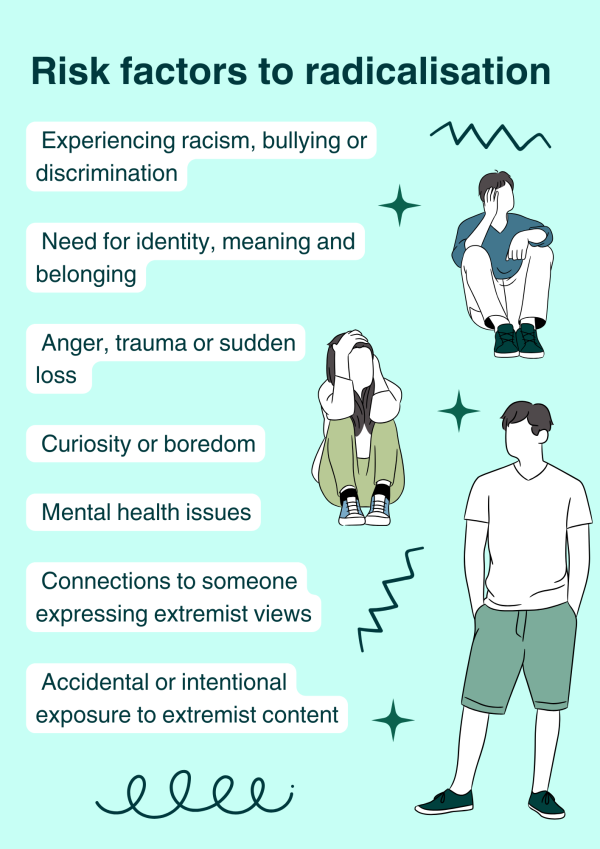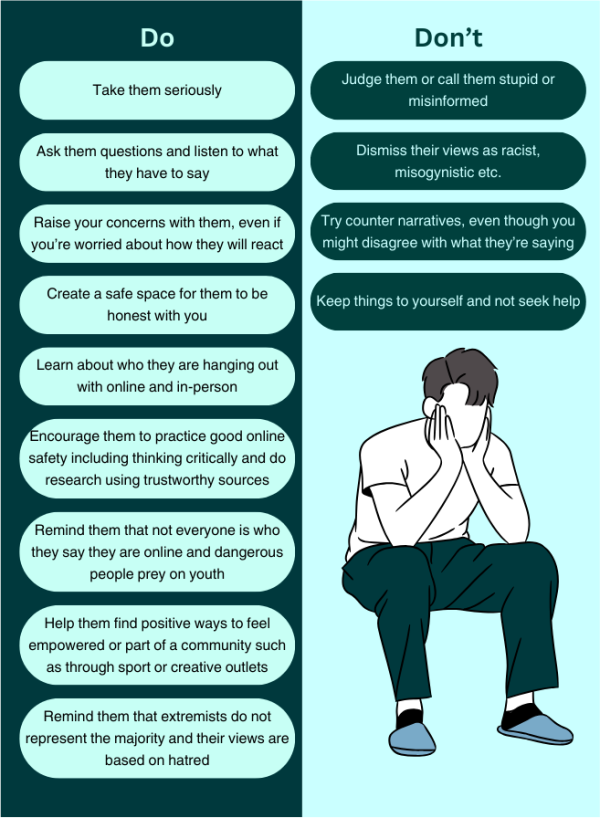It can be daunting to consider that your child or someone you love might be vulnerable to radicalisation. However, recognising the warning signs and acting early can protect them before their views become more extreme and present a danger to themselves or others.
What could make my child vulnerable to radicalisation?
In young people especially, it can be difficult to distinguish between typical 'teenage angst' and signs of radicalisation towards hate or an extremist ideology. Parents and caregivers are well-placed to notice small changes in behaviour and it is important to trust your instincts.
Risk factors
Teenage years are a naturally volatile time, full of change and uncertainty and most young people won't become radicalised to violent extremism. However, for some young people, underlying issues can make them vulnerable to radicalisation or exploitation by extremist groups.
There is no single, defined pathway to radicalisation, however, some factors may make a young person more susceptible to extremism.

Remember just because someone is at risk of one of the factors listed below, does not mean they will automatically adopt extremist beliefs.
What are the stages of radicalisation?
Radicalisation happens in stages. Overtime behaviour and views may become more extreme and in serious cases can lead to engagement in violence or terrorism. The radicalisation process looks different for everyone however, some common stages include:
- Taking interest in an extremist ideology, group or organisation
- Acceptance of the extremist rhetoric as their own
- Further indoctrination and consolidation of an 'us and them' mentality
- Engagement in violence or terrorism
Early warning signs
Whilst there is no one pathway from radicalisation to violent extremism, there are some behaviours and patterns to be aware of. The New Zealand Security Intelligence Service has released a public guide to raise awareness of some of the key warning signs that are most concerning in individuals on a pathway to violent extremism.
Just because someone is displaying certain behaviours does not mean they are becoming radicalised. Remember the these behaviours are concerning when they occur alongside other activities.
Safeguarding vulnerable individuals
Explore Hāpaigna Ora are part of the New Zealand Health Group and support with individuals with disabilities and their whānau. They have worked together with Carers NZ and Autism NZ, to develop content that's targeted for families to help prevent vulnerable individuals from terrorist and violent extremism.
Responding to radicalisation
The importance of acting early
Acting early is the best way to prevent harm to the person you're worried about, and others. The earlier someone gets help, the more likely they will be diverted away from violent extremism. It can be difficult to know if you should be concerned, but it is important to trust your instincts and seek help and advice quickly.
How to talk to your child about your concerns
If you are concerned about someone you know it may help to speak to them about your concerns. Below are some tips to help you have these difficult conversations when talking to your child. For more tips and advice visit the Act Early or Educate Against Hate website.

You can contact He Aranga Ake at the New Zealand Police for further advice. He Aranga Ake is intended for someone who may pose a violent extremist or terrorist threat of harm to a community or themselves due to identifying with ideologies associated with violent extremism.
While He Aranga Ake is unable to accept direct referrals from the public at this time, if, as a member of the public, you have concerns about an individual you can raise these with one of the participating agencies. Or you can provide information via:
- police.govt.nz(link is external)(external link)or calling Police's non-emergency number 105
- Visiting your nearest Police station (external link)and making a report
- Phoning Crimestoppers on 0800 555 111 (this is an anonymous option)
- Contacting New Zealand Security and Intelligence Service through 0800 747 224 or nzsis.govt.nz/contact-us/providing-information/(link is external)(external link)
- Calling 111 in an emergency.